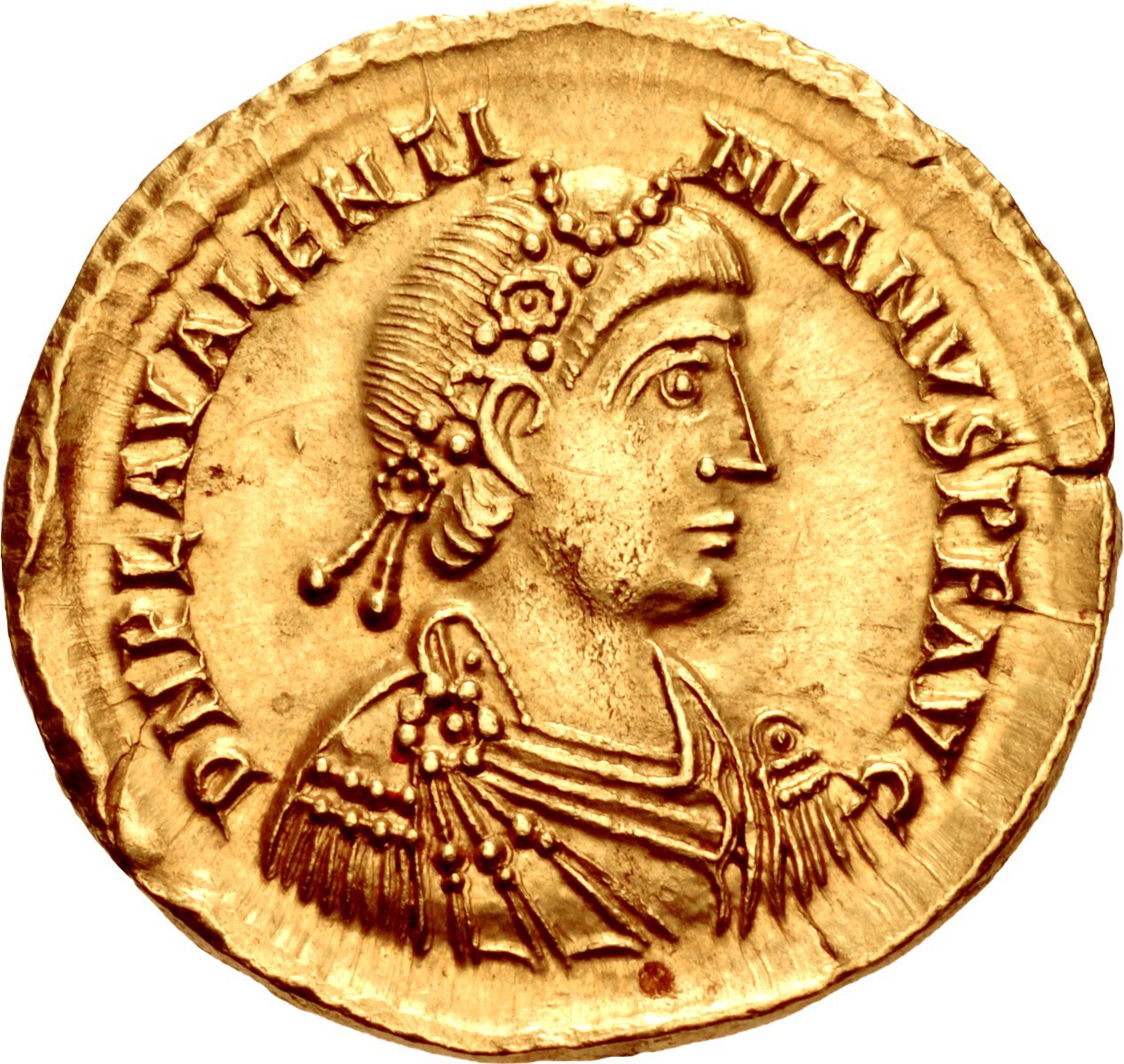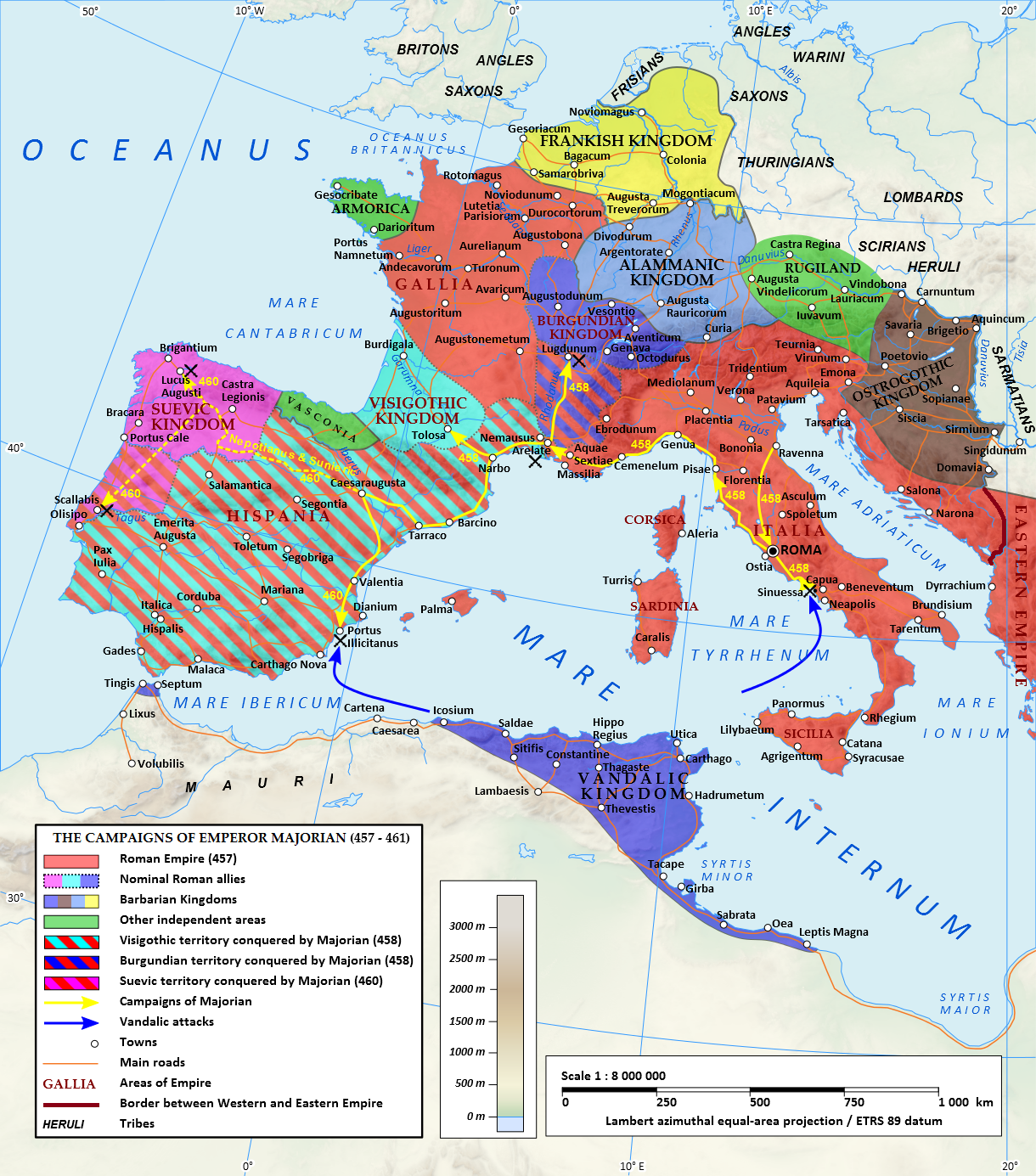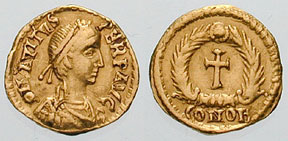|
Sidonius Apollinaris
Gaius Sollius Modestus Apollinaris Sidonius, better known as Sidonius Apollinaris (5 November of an unknown year, 430 – 481/490 AD), was a poet, diplomat, and bishop. Sidonius is "the single most important surviving author from 5th-century Gaul" according to Eric Goldberg. He was one of four Gallo-Roman aristocrats of the 5th- to 6th-century whose letters survive in quantity; the others are Ruricius, bishop of Limoges (died 507), Alcimus Ecdicius Avitus, bishop of Vienne (died 518) and Magnus Felix Ennodius of Arles, bishop of Ticinum (died 534). All of them were linked in the tightly bound aristocratic Gallo-Roman network that provided the bishops of Catholic Gaul. His feast day is 21 August. Life Sidonius was born in Lugdunum (modern Lyon). His father, whose name is unknown, was Prefect of Gaul under Valentinian III (Sidonius recalls with pride being present with his father at the installation of Astyrius as consul for the year 449.) Sidonius' grandfather was Praetorian ... [...More Info...] [...Related Items...] OR: [Wikipedia] [Google] [Baidu] |
Saint
In religious belief, a saint is a person who is recognized as having an exceptional degree of Q-D-Š, holiness, likeness, or closeness to God. However, the use of the term ''saint'' depends on the context and Christian denomination, denomination. In Catholic Church, Catholic, Eastern Orthodox Church, Eastern Orthodox, Anglican Communion, Anglican, Oriental Orthodox, and Lutheranism, Lutheran doctrine, all of their faithful deceased in Heaven are considered to be saints, but some are considered worthy of greater honor or emulation. Official ecclesiastical recognition, and consequently a public cult of veneration, is conferred on some denominational saints through the process of canonization in the Catholic Church or glorification in the Eastern Orthodox Church after their approval. While the English word ''saint'' originated in Christianity, History of religion, historians of religion tend to use the appellation "in a more general way to refer to the state of special holiness t ... [...More Info...] [...Related Items...] OR: [Wikipedia] [Google] [Baidu] |
Valentinian III
Valentinian III ( la, Placidus Valentinianus; 2 July 41916 March 455) was Roman emperor in the West from 425 to 455. Made emperor in childhood, his reign over the Roman Empire was one of the longest, but was dominated by powerful generals vying for power amid civil wars and the invasions of Late Antiquity's Migration Period, including the campaigns of Attila the Hun. He was the son of Galla Placidia and Constantius III, and as the great-grandson of Valentinian I () he was the last emperor of the Valentinianic dynasty. As a grandson of Theodosius I (), Valentinian was also a member of the Theodosian dynasty, to which his wife, Licinia Eudoxia, also belonged. A year before assuming the rank of ''augustus'', Valentinian was given the imperial rank of '' caesar'' by his half-cousin and co-emperor Theodosius II (). The '' augusta'' Galla Placidia had great influence during her son's rule. During his early reign Aetius, Felix, and the ''comes africae'', Bonifacius all competed ... [...More Info...] [...Related Items...] OR: [Wikipedia] [Google] [Baidu] |
Majorian
Majorian ( la, Iulius Valerius Maiorianus; died 7 August 461) was the western Roman emperor from 457 to 461. A prominent general of the Roman army, Majorian deposed Emperor Avitus in 457 and succeeded him. Majorian was the last emperor to make a concerted effort to restore the Western Roman Empire with its own forces. Possessing little more than Italy, Dalmatia, and some territory in northern Gaul, Majorian campaigned rigorously for three years against the Empire's enemies. His successors until the fall of the Empire, in 476–480, were actually instruments of their barbarian generals, or emperors chosen and controlled by the Eastern Roman court. After defeating a Vandal attack on Italy, Majorian launched a campaign against the Visigothic Kingdom in southern Gaul. Defeating king Theodoric II at the Battle of Arelate, Majorian forced the Goths to abandon their possessions in Septimania and Hispania and return to federate status. Majorian then attacked the Burgundian King ... [...More Info...] [...Related Items...] OR: [Wikipedia] [Google] [Baidu] |
Claudianus Mamertus
Claudianus Ecdidius Mamertus (died c. 473 AD) was a Gallo-Roman theologian and the younger brother of Saint Mamertus, Bishop of Vienne. Biography Descended probably from one of the leading families of the country, Claudianus Mamertus relinquished his worldly goods and embraced the monastic life. He assisted his brother in the discharge of his functions, and Sidonius Apollinaris describes him as directing the psalm-singing of the chanters, who were formed into groups and chanted alternate verses, whilst the bishop was at the altar celebrating the sacred mysteries. This passage is of importance in the history of liturgical chant. In the same epigram, which constitutes the epitaph of Claudianus Mamertus, Sidonius also informs us that this distinguished scholar composed a lectionary, that is, a collection of readings from Sacred Scripture to be made on the occasion of certain celebrations during the year. Writings According to the same writer, Claudianus "pierced the sects with the ... [...More Info...] [...Related Items...] OR: [Wikipedia] [Google] [Baidu] |
Faustus Of Riez
Saint Faustus of Riez was an early Bishop of Riez (Rhegium) in Southern Gaul (Provence), the best known and most distinguished defender of Semipelagianism. Biography Faustus was born between 400 and 410, and his contemporaries, Avitus of Vienne and Sidonius Apollinaris, say that he was born in Britain. In his youth he was devoted to the study of elocution and Christian philosophy. He is thought by some to have been a lawyer but owing to the influence of his mother, famed for her sanctity, he abandoned secular pursuits as a young man and entered the monastery of Lérins. Here he was soon ordained to the priesthood and after about eight years, because of his extraordinary piety was chosen in 432 to be head of the monastery, in succession to Maximus who had become Bishop of Riez."Fa ... [...More Info...] [...Related Items...] OR: [Wikipedia] [Google] [Baidu] |
Theodor Mommsen
Christian Matthias Theodor Mommsen (; 30 November 1817 – 1 November 1903) was a German classical scholar, historian, jurist, journalist, politician and archaeologist. He is widely regarded as one of the greatest classicists of the 19th century. His work regarding Roman history is still of fundamental importance for contemporary research. He received the 1902 Nobel Prize in Literature for being "the greatest living master of the art of historical writing, with special reference to his monumental work, ''History of Rome (Mommsen), A History of Rome''", after having been nominated by 18 members of the Prussian Academy of Sciences. He was also a prominent German politician, as a member of the Prussian and German parliaments. His works on Roman law and on the law of obligations had a significant impact on the Bürgerliches Gesetzbuch, German civil code. Life Mommsen was born to German parents in Garding in the Duchy of Schleswig in 1817, then ruled by the king of Denmark, and gr ... [...More Info...] [...Related Items...] OR: [Wikipedia] [Google] [Baidu] |
Gregory Of Tours
Gregory of Tours (30 November 538 – 17 November 594 AD) was a Gallo-Roman historian and Bishop of Tours, which made him a leading prelate of the area that had been previously referred to as Gaul by the Romans. He was born Georgius Florentius and later added the name Gregorius in honour of his maternal great-grandfather. He is the primary contemporary source for Merovingian history. His most notable work was his ''Decem Libri Historiarum'' (''Ten Books of Histories''), better known as the ''Historia Francorum'' (''History of the Franks''), a title that later chroniclers gave to it. He is also known for his accounts of the miracles of saints, especially four books of the miracles of Martin of Tours. St. Martin's tomb was a major pilgrimage destination in the 6th century, and St. Gregory's writings had the practical effect of promoting highly organized devotion. Biography Gregory was born in Clermont, in the Auvergne region of central Gaul. He was born into the upper stratu ... [...More Info...] [...Related Items...] OR: [Wikipedia] [Google] [Baidu] |
Apollinaris Of Clermont
Apollinaris (died 515) was a count of Auvergne who led a auvergnat army for the Visigoths in the Battle of Vouillé, and was bishop of Clermont for four months before his death. Life Apollinaris was the son of the aristocrat and poet Sidonius Apollinaris and Papianilla. A number of contemporary Romano-Gallic aristocrats were his cousins, including bishops Avitus of Vienne and Ruricius of Limoges. Earliest records of Apollinaris are in the letters of his father Sidonius. Although Apollinaris is the recipient of one letter (''Epistulae'' III.13), E.H. Warmington considers it a "show-piece" which was never actually sent to him. Sidonius mentions Apollinaris in several of his letters: two allude to his youth (in V.11, he describes Apollinaris as "in these budding years of manhood", and in V.9 hopes that Apollinaris would have children), another mentions Apollinaris' love of hunting, and in the last laments his disinterest in literature. Despite his father's opinion, Apollinaris ... [...More Info...] [...Related Items...] OR: [Wikipedia] [Google] [Baidu] |
Avitus
Eparchius Avitus (c. 390 – 457) was Roman emperor of the West from July 455 to October 456. He was a senator of Gallic extraction and a high-ranking officer both in the civil and military administration, as well as Bishop of Piacenza. He opposed the reduction of the Western Roman Empire to Italy alone, both politically and from an administrative point of view. For this reason, as Emperor he introduced several Gallic senators in the Imperial administration; this policy, however, was opposed by the senatorial aristocracy and by the people of Rome, who had suffered from the sack of the city by the Vandals in 455. Avitus had a good relationship with the Visigoths, in particular with their king Theodoric II, who was a friend of his and who acclaimed Avitus Emperor. The possibility of a strong and useful alliance between the Visigoths and Romans faded, however, when Theodoric invaded Hispania at Avitus' behest, which rendered him unable to help Avitus against the rebel Roman ge ... [...More Info...] [...Related Items...] OR: [Wikipedia] [Google] [Baidu] |
Papianilla, Wife Of Sidonius Apollinaris
Papianilla (''floruit'' 455) was an aristocrat of Roman Gaul. She was the daughter of Eparchius Avitus, who rose from the Gallo-Roman senatorial aristocracy to become Western Roman Emperor from 455 to 456. Papianilla had two brothers, Agricola and Ecdicius, and possibly some sisters; she was related to another Papianilla (wife of the prefect Tonantius Ferreolus). Before her father's rise to the throne (455), she married Sidonius Apollinaris, another aristocrat, with whom she had three or four children: Apollinaris, Severiana, Roscia and Alcima (the latter, mentioned only in Gregory of Tours and not in Sidonius letters, being possibly another name for Severiana or Roscia). Papianilla brought her husband the estate called ''Avitacum'' in Auvergne. Her husband gave away silver vessels from their home to the poor, but she criticised him so he bought them back. Gregory of Tours, ''History of the Franks'', II, 22 Notes {{Reflist Sources * "Papianilla 2", ''Prosopography of the ... [...More Info...] [...Related Items...] OR: [Wikipedia] [Google] [Baidu] |
Constantine II (emperor)
Constantine II ( la, Flavius Claudius Constantinus; February 316 – 340) was Roman emperor from 337 to 340. Son of Constantine the Great and co-emperor alongside his brothers, his attempt to exert his perceived rights of primogeniture led to his death in a failed invasion of Italy in 340. Career The eldest son of Constantine the Great and Fausta, Constantine II was born in Arles in February 316 and raised as a Christian. Caesar On 1 March 317, he was made Caesar. In 323, at the age of seven, he took part in his father's campaign against the Sarmatians. At age ten, he became commander of Gaul, following the death of his half-brother Crispus. An inscription dating to 330 records the title of ''Alamannicus'', so it is probable that his generals won a victory over the Alamanni. His military career continued when Constantine I made him field commander during the 332 campaign against the Goths. Augustus Following the death of his father in 337, Constantine II initially b ... [...More Info...] [...Related Items...] OR: [Wikipedia] [Google] [Baidu] |
Decimus Rusticus
Decimus Rusticus (sometimes Rusticus Decimus) of Treves (then ''Augusta Treverorum'') and Lyon ('' Lugdunum'') (c. 370 – before 423) was a Master of the Offices and the praetorian prefect of Gaul between 409 and 410 or 413. He was one of those responsible for the withdrawal from Britannia. Life In 407, the Roman army in Britain chose as their leader Flavius Claudius Constantinus. He crossed the Channel to the continent, and by May 408 had made Arles his capital, where he appointed Apollinaris, grandfather of Sidonius Apollinaris, as prefect.Jones, Arnold Hugh Martin, John Robert Martindale, John Morris, ''The Prosopography of the Later Roman Empire'', vol. 2, Cambridge University Press, 1992, , p. 113 Decimus Rusticus succeeded his friend Apollinaris, as praetorian prefect of Gaul in 409. He was captured by the army commanders of Emperor Honorius and put to death. About him, Sidonius Apollinaris to his friend Aquilinus: I find it certainly to my advantage, friend capab ... [...More Info...] [...Related Items...] OR: [Wikipedia] [Google] [Baidu] |






